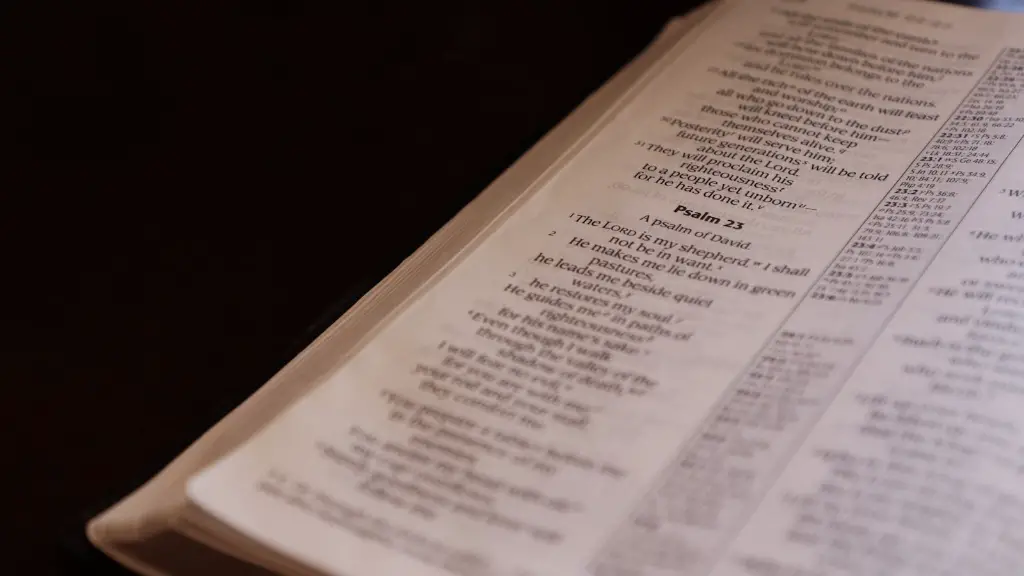Who Were The Nicolaitans In The Bible?
The Bible offers very little in terms of concrete information about who the Nicolaitans were and why they were so villainized. It is known that the term Nicolaitan can be traced back to the Greek form of the name Nicolas. Nicolas was a convert to Christianity just after the death of Christ, and it has been suggested that the Nicolaitans had some association with the Seven Churches of Asia Minor, mentioned in the book of Revelation.
Most Biblical scholars believe that the group was named for a philosopher of that name. Nicolas was thought to have been a leader of the heretical sect called the Gnostics. These ancient Palestine followers believed that a divine being called the Gnostic Redeemer created an angelic hierarchy of angels to carry out his will and to govern the universe. This belief was in stark contrast to orthodox Christian theology, which firmly maintained the monotheism of the Old and New Testaments.
The writings of the sect looked very similar to Christianity, but included mysticism, astrology, and ritualistic practices that biblical scholars viewed as blasphemous. They were also practicing what was known as libertinism and many theologians would label this as a form of immorality. This would later become the primary reason why the Nicolaitans were so heavily chastised in the book of Revelation.
The members of the sect were obviously distanced from those that followed the teachings of the True Way, and this created a lot of conflict. The differences between the two groups, and the practices of each, would ultimately become the catalyst for their rejection by the church. In the scriptures, it appears that the Nicolaitans had gained a certain amount of power, and were influencing Christians away from following the teachings of Jesus. The results of this was the inability of the true followers to obey the commands of the Lord and ultimately spread their message.
Beyond this, the true source of the Nicolaitans’ villainy is anyones guess, as the Bible does not offer any substantial detail about the group, or their beliefs and practices. What is clear is that the church viewed them with suspicion and disfavor, and that the Nicolaitans had a significant influence on early Christian life. Through the book of Revelation and other writings, historians and theologians are able to gain some insight into the group, and to attempt to reconstruct the beliefs of this long lost sect.
What Was The Final Fate Of The Nicolaitans?
As with so much of religious history in the ancient world, the final fate of the Nicolaitans is somewhat of a mystery. It is believed that the group ultimately dissolved when the Roman Empire began to expand its reach and Ancient Christianity took over in the region. This is thought to have been due to the strong opposition to this sect of believers held by the general populace.
Despite its disappearance, the Nicolaitans continue to make an impact on the world today. Its teachings and beliefs have become part of the collective understanding of Christianity and its actions against the church were certainly not forgotten. The impact that this group had on early Christian life is still being considered and studied by modern theologians, as it provides valuable insight into the religious landscape of the ancient world.
In recent years, many modern interpretations of the Nicolaitans have emerged. These interpretations include ideas that the group was not only a believer of immorality, but also of free will, creativity and higher learning. Other claims have been made that the group was actively involved in the underground movement that would eventually form the basis of the Church and its belief system.
Regardless of what the group represented, it is certain that the Nicolaitans were a key part of religious history and they played an important role in the development of several of the world’s major religions. By examining their practices and beliefs, we can gain a better understanding of the diversity of faith and cultures in the ancient world.
What Was The Teachings And Beliefs Of The Nicolaitans?
Little is known about the exact beliefs and teachings of the Nicolaitans. Their philosophies, customs, and rituals were largely left to speculation based on the limited written accounts of their activities.
It is believed that the group may have practiced a form of secret religious practices, such as astrology or worship of the divine being. Additionally, some theorize that the group’s beliefs included ideas about free will and creativity, as well as higher learning.
Although many aspects of the group’s beliefs and practices remain unknown, what does remain clear is that the Nicolaitans’ teachings and practices were seen as deeply deviant and threatening to the current Christian orthodoxy. This is why the group was so heavily chastised by the Church at the time.
Today, however, some theologians and historians find fascination in the philosophy and teachings of the Nicolaitans and actively explore their practices in an effort to better understand the diversity of beliefs in the ancient world.
What Was The Significance Of The Nicolaitans?
The Nicolaitans were a significant force in the development of early Christianity and modern interpretation of religion. As a heresiological sect, they served as a direct contrast to the orthodoxy of the Church, bringing to light previously unknown ideas and allowing for a more free-thinking approach to religious doctrine.
The teachings of the group had an influence far beyond their own small circle of followers. As a result, the group’s ideas and beliefs were transmitted to other groups, including the nascent Christian movement. This in turn led to a greater understanding of the complexity and diversity of early Christianity and ultimately informed the development of modern interpretations of the Bible.
The group’s influence continues to be felt in current discussions about religion and the origins of Christianity. The mysterious nature of the group and its practices has stirred up curiosity and intrigue in theologians, historians and casual readers alike, who continue to search for answers about the mysterious sect and their impact on early Christianity.
What Are The Relevance Of The Nicolaitans In Today’s World?
The relevance of the Nicolaitans in today’s world lies in their importance in the development of religious ideas and beliefs. By understanding their history, and the significant impact they had on early Christianity, we are better able to understand the complexities of the ancient world, as well as appreciate the diversity of faith and thought in our current society.
The teachings of the Nicolaitans, while deemed heretical by the Church at the time, still serve as a source of fascination and exploration in current times. As people continue to discuss the diversity of belief and thought, exploring the teachings and beliefs of the sect is a valuable tool in understanding religious relationships and discourse today.
In addition, the actions of the Nicolaitans also serve as an example of courage and perseverance in the face of oppression. For example, their ability to resist the cultural expectations of the Roman Empire and stand firm in their faith, despite potential persecution, is a powerful reminder of the power of commitment to one’s beliefs and values.
How Do We Remember The Nicolaitans Today?
The Nicolaitans remain an intriguingly mysterious group in religious history, and many are curious about their teachings and beliefs. As a result, the group is remembered and discussed often in various religious circles, providing an interesting glimpse into the ancient world.
In addition, many theorists have taken the ancient teachings of the Nicolaitans and integrated them into modern thought and understanding. This type of exploration and intellectual curiosity allows people of today to gain a more holistic understanding of the development of religious dogma and culture in the ancient world.
Finally, the Nicolaitans remain a symbol of courage in the face of opposition. Their commitment to their beliefs, even in the face of potential persecution, is an ideal that many strive to follow. For these reasons, the Nicolaitans are a valuable and inspiring reminder of the power of faith and resistance.




